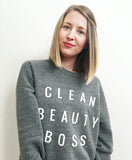
You may have heard in the news recently that Hawaii is banning sunscreens that can harm coral reefs. But what does that mean, exactly? And how do you know if your sunscreen is safe?
Believe it or not, not all sunscreen is created equal, nor is it all safe for your body or the environment.
How Most Sunscreen Is Depleting the Coral Reefs
Most conventional sunscreens contain two ingredients of concern: oxybenzone and octinoxate. Not only have these been linked to issues in humans like endocrine disruption, thyroid issues, and altered reproductive development, but they are also linked to the depletion of coral reefs in the ocean.
Oxybenzone and octinoxate have been shown to strip coral of its nutrients and cause DNA damage. Oxybenzone also worsens the process of coral bleaching (this is where coral rejects symbiotic organisms and loses its color). These ingredients also disrupt the development of fish and other marine wildlife in the area.

Bleached coral in the Great Barrier Reef Keppel Bleaching, Wikipedia
According to a study from the Archives of Environmental Contamination and Toxicology, about 14,000 tons of sunscreen end up in coral reefs around the world each year. The greatest damage has been done in areas like Hawaii and the Caribbean that host a lot of tourism on their beaches.
So if that much sunscreen is washing into the ocean, we definitely want to do what we can to make sure it’s safe! It’s so important to protect our reefs because they actually serve as carbon sinks and absorb carbon dioxide, which would otherwise contribute to global warming.
Use Non-Nano Mineral Sunscreen Instead
You might be wondering what you can use instead! There’s always the option of covering up with a t-shirt or hat, but there’s also the option of mineral sunscreen that is also “reef safe.”
On a sunscreen label, look for either titanium dioxide or zinc oxide. These are minerals that offer physical sun protection.
Even further, you want to make sure they are “non-nano” which typically means the particles are not small enough to be absorbed into your bloodstream. There is some conflicting evidence as to whether non-nano can actually be absorbed fully or not (the EWG now reports that nano or not, zinc and titanium dioxide are NOT capable of entering the bloodstream). A nanoparticle is a piece of material that is so small it has to be measured in nanometers. Zinc oxide and titanium dioxide are only considered reef safe if they are non-nano because if they are below 100 nanometers, the creams can be ingested by corals.
Reef Safe Sunscreens from The Choosy Chick
So, do you need help finding sunscreens that are 1) coral reef safe 2) totally natural and non-toxic and 3) effective? Lucky for you, The Choosy Chick carries a bunch right here.

Raw Elements Daily Lifestyle SPF 30 Pump
Raw Elements was developed by a veteran Ocean Rescue Lifeguard who dedicated himself to creating a natural sunscreen with certified organic ingredients. They have created unique physical UV protection through their Organic Eco-Shield Performance Technology. They recently partnered with Hawaiian Airlines to offer samples of this sunscreen to guests on all flights from North America to Hawaii. Check out the other Raw Elements sunscreens from The Choosy Chick!

Badger Broad Spectrum Sport SPF 35
Badger Sport is made with uncoated, non-nano zinc oxide and is water resistant for at least 80 minutes. And it contains skin-loving ingredients that nourish. See the other Badger sunscreen products from The Choosy Chick (for the whole family!).

Kimberly Sayer Ultra-Light Facial Moisturizer SPF 30
An amazing lightweight moisturizer for acne-prone or oily skin, plus it has SPF! Made with non-nano zinc oxide and titanium dioxide. There’s also an SPF 30 Antioxidant Daily Moisturizer for dry, sensitive skin.

Kari Gran Three Sixty Five SPF 28
This eco-luxe combination of organic, non-GMO facial oils is also a broad-spectrum sunscreen that can be worn every day of the year. It contains non-nano zinc oxide and protects against UVA and UVB rays.
Written by: Organically Becca
 Becca is a blogger, wife, and dog mom from Milwaukee, Wisconsin. She’s on a mission to get the word out about chemicals found in our everyday items like makeup, food, and personal care products. She provides education on ways you can live a more holistic life and easy swaps you can make in your routine to naturally safer products. Check out Becca’s blog organicallybecca.com and catch her on Instagram @organicallybecca.
Becca is a blogger, wife, and dog mom from Milwaukee, Wisconsin. She’s on a mission to get the word out about chemicals found in our everyday items like makeup, food, and personal care products. She provides education on ways you can live a more holistic life and easy swaps you can make in your routine to naturally safer products. Check out Becca’s blog organicallybecca.com and catch her on Instagram @organicallybecca.


